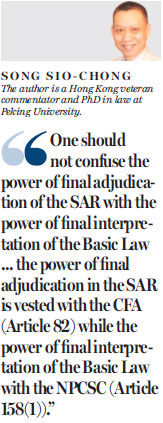NPCSC interpretation helps enhance rule of law
Updated: 2016-11-11 07:03
By Song Sio-chong(HK Edition)
|
|||||||
Song Sio-chong says the power of a final interpretation of the Basic Law ultimately lies within the NPCSC - not in the CFA - because the constitutional document for the SAR is a national law
Some legal professionals staged a silent march on Tuesday night in protest against the interpretation of Article 104 of the Basic Law by the National People's Congress Standing Committee (NPCSC). They claimed the move was unnecessary and harmed Hong Kong's judicial independence and the rule of law. I hold the opposite view.
The critics argue: There has been a judicial review case dealing with the oath-taking row; the NPCSC should wait until the case reaches the Court of Final Appeal (CFA) and let the CFA take the initiative to request an interpretation by the NPCSC through the procedures as stipulated in Article 158(3) of the Basic Law.
To those who do not study law in detail, such arguments sound fine on the surface. But as we know, the pending judicial case concerns only two Youngspiration legislators-elect, who have made an obviously invalid oath, and the LegCo president's initial decision to allow them to retake the oath; whereas the interpretation of Article 104 has a broader level of concern. Aside from the validity of the oaths of the Youngspiration duo, it also concerns those of the other radical lawmakers who have taken the oath improperly; the interpretation of Article 104 was also intended to clarify the oath-taking requirements for all senior public officials including LegCo members. They are required by the Basic Law to pledge political allegiance to the Hong Kong SAR of the People's Republic of China. The scope of the oath-taking judicial review case appears to be so narrow it may not serve the role which Article 104 of the Basic Law intends.

The time frame of the judicial review case is also an important factor that should not be overlooked. Common sense shows us that the losing party is very likely to appeal to the higher court until the CFA reaches its final adjudication. It could take a few years to complete the whole judicial process. In other words, the oath-taking row will drag on for years, affecting the normal functions of LegCo and the stability of society.
This is not the end of the story. If the CFA believes the High Court can resolve the case on its own and see no need to request an interpretation of Article 104 by the NPCSC, the result will be disastrous, given that Article 104 has been so wrongly construed by many people.
Furthermore, the power of final interpretation of the Basic Law is vested in the NPCSC - not in the CFA - because it is a national law. Meanwhile, the possibility of incorrect judicial interpretation cannot be precluded. In such a case, why not let the NPCSC interpret Article 104 earlier than later to avoid such an incident from happening for the benefit of all society. To most of us, prevention is always better than cure.
In view of this the NPCSC may take the initiative to interpret Article 104 of the Basic Law under Article 158(1) sooner or later anyway, and aspects of the existing judicial case, if any, are less important, compared with the assurance of a correct interpretation of Article 104 of the Basic Law.
One should not confuse the power of final adjudication of the SAR with the power of final interpretation of the Basic Law. As opposed to the practice in other common law jurisdictions where both the power of final adjudication and the final power of interpretation of the constitution are combined and conferred to the highest court, the power of final adjudication in the SAR is vested with the CFA (Article 82) while the power of final interpretation of the Basic Law with the NPCSC (Article 158(1)). That is to say, the NPCSC's interpretation of the Basic Law is called a legislative interpretation which is higher than a judicial interpretation. Despite the fact that the CFA may also interpret the Basic Law as provided in Article 158(2) and (3), such interpretation will not be final or subject to the NPCSC's interpretation.
The reason is simple: The CFA is only the highest court of the SAR; its interpretation of the Basic Law - a national law - can only apply locally, whereas the NPCSC is the highest national legislative body and its interpretation should apply nationwide. Such an arrangement under the Basic Law will not affect the CFA's past verdicts, but may help to correct ongoing judicial interpretations. It will be illogical to say that legislative interpretation which is higher than a judicial interpretation will affect judicial independence.
Not only will Hong Kong's judicial independence as guaranteed by the Basic Law remain intact, the NPCSC's interpretation will actually enhance it and the rule of law.
In adjudicating cases involving the Basic Law, all courts including the CFA must correctly apply the relevant articles of the Basic Law. This requires a correct interpretation of the Basic Law. Without a correct interpretation and application of the Basic Law, there will be no rule of law. To follow the final interpretation of the Basic law is always better than to follow less-conclusive judicial interpretation of the Basic law, judging from a rule of law viewpoint.
(HK Edition 11/11/2016 page9)